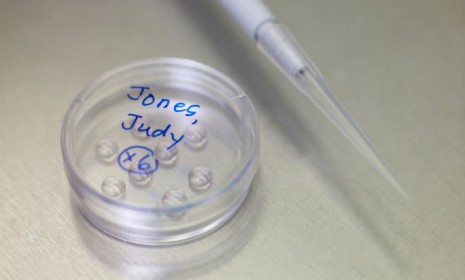How safe is it for women to freeze their eggs?
After years of branding the practice as "experimental," the American Society of Reproductive Medicine changes its tune

A free daily email with the biggest news stories of the day – and the best features from TheWeek.com
You are now subscribed
Your newsletter sign-up was successful
The American Society of Reproductive Medicine (ASRM) has concluded that freezing a woman's eggs should no longer be considered "experimental." The practice, which has long been targeted by critics who question its safety, has become increasingly popular in recent years as more and more women hope to get pregnant later in life. But is it really safe? Here's what you should know:
Why do women freeze their eggs?
Older women sometimes use the frozen eggs of younger women to become pregnant. And more and more, younger women in their twenties are freezing their eggs while they "finish school, focus on their jobs, or keep looking for the right guy," says Rob Stein at NPR. In other cases, the practice, which costs anywhere from $10,000 to $15,000, helps cancer patients preserve their fertility after chemotherapy wipes out their ovaries.
The Week
Escape your echo chamber. Get the facts behind the news, plus analysis from multiple perspectives.

Sign up for The Week's Free Newsletters
From our morning news briefing to a weekly Good News Newsletter, get the best of The Week delivered directly to your inbox.
From our morning news briefing to a weekly Good News Newsletter, get the best of The Week delivered directly to your inbox.
Why is this controversial?
Not everyone thinks it's a good idea for healthy women to "freeze their eggs as sort of an insurance policy against infertility in case they don't meet Mr. Right — or just aren't ready for motherhood — until their 30s or beyond, when the childbearing window is closing fast," says Lauran Neergaard at the Associated Press. Success rates aren't exactly through the roof, and often "it's an insurance policy that many of those women may never need to turn in," says Dr. Erica Widra at Georgetown University, who chaired the committee's guidelines.
Why did ASRM change its tune?
Citing several studies, the group concluded that younger women have about the same odds of getting pregnant using frozen eggs for their infertility treatment as fresh ones. And babies born from frozen eggs "seem to be healthy," says NPR's Stein.
A free daily email with the biggest news stories of the day – and the best features from TheWeek.com
Does this procedure still have critics?
Indeed it does. "Don't believe the hype," argues Amanda Marcotte at Slate. Though technology has improved contraception rates, "the process of freezing eggs is somewhat dangerous, including a possible higher risk of developing ovarian cancer." And I, for one, am still suspicious of doctors "willing to take thousands of dollars from women to put them through this process on the slim hope that it's going to solve their work-life balance dilemmas."
Sources: The Associated Press, CNN, NPR, Slate
-
 6 exquisite homes with vast acreage
6 exquisite homes with vast acreageFeature Featuring an off-the-grid contemporary home in New Mexico and lakefront farmhouse in Massachusetts
-
 Film reviews: ‘Wuthering Heights,’ ‘Good Luck, Have Fun, Don’t Die,’ and ‘Sirat’
Film reviews: ‘Wuthering Heights,’ ‘Good Luck, Have Fun, Don’t Die,’ and ‘Sirat’Feature An inconvenient love torments a would-be couple, a gonzo time traveler seeks to save humanity from AI, and a father’s desperate search goes deeply sideways
-
 Political cartoons for February 16
Political cartoons for February 16Cartoons Monday’s political cartoons include President's Day, a valentine from the Epstein files, and more